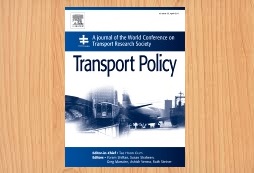- March 22, 2017
- Posted by: Kleopatra Arapi
- Category: Calls

The Theme of the Special Issue
The port and shipping industries are currently encountering a profound period of change. In particular, the shipping sector experiences a chronical overcapacity and shipowners are constantly in trouble to capture demand. Shipping business is considered capital intensive, freight rates are unlikely to be bounced back in a short term. As a consequence, shipping firms have difficulty having generated reasonable profits. Analogously, ports are called to cope with unprecedented levels of competition due to the slow-down of the world trade and the emergence of overcapacity concerns. Terminal operators are rediscovering market risks and struggling to offer shipowners service packages rewarding their own balance sheet. Under this perspective, top managers, commercial executives, ship agents and brokers are all enforced to explore a new way of business-making; some of which are marketing policies in terms of segmentation, market positioning, service levels, pricing mechanisms, relations with stakeholders and value proposition solutions.
Port Authorities (PAs) are, in turn, fully aware that the implementation of a successful landlord model requires much more than a basic separation of competences with private investors. The managerialization and often the corporatization of PAs introduce the consciousness that the undertaking of well-established marketing policies is fundamental to deal with a complex array of public and private stakeholders as well as to face ongoing market challenges. In addition, PAs realized that, besides territorial marketing policies, they are expected to act as powerful B2B value generators along transport chains, by stimulating and facilitating the interactions among private players. In a rising number of cases, PAs explore new strategic areas, even becoming entrepreneurs that invest in overseas port facilities and other logistics infrastructures.
Despite the growing relevance of marketing policies and strategies in shipping and port industries, however, no extensive academic research has been yet made. Journal articles and books published are few and address the themes of 4Ps and market-driven management without analyzing the subject in the context of current and prospective maritime transport and logistics management. Contributions are rather fragmented as often investigated isolated cases, without grounding on a broad analytical framework.
Indeed, a number of marketing-related perspectives and theoretical streams deserve further scrutiny and application in these industries. For instance, in liner shipping the principles of service marketing could offer insights into understanding the redesign of maritime service networks being taken place for reinforcing the value proposition delivered to shippers. The composition of service items, the management of the co-production process, and the offer of bundled packages also constitute important themes to be investigated. Next to this, the pricing strategies and revenue management techniques applied by tramp operators, liner carriers and terminal companies are other cutting-edge topics that should attract the interest of scholars. Consistent with ongoing market uncertainty, revenue management aims to pursue the integrated management of price and vessel capacity (inventory) to maximize the profitability of a company. In the understanding of value delivery, the analysis of various forms of communication, trade and business development and customer relationship management could also bring insightful and original pictures of the shipping industry.
In addition, ports encounter special challenges given the heterogeneous nature of the players involved and the growing responsibilities that PAs hold in the coordination of the entire cluster architecture. For this reasons, future studies should disentangle the hybridity of marketing strategies of port stakeholders including PAs, ranging from B2B to territorial marketing objectives. The study of the inter-organizational constellations of value in modern port communities is needed, by identifying the key business relationships that shape successful marketing strategies.
Subject Coverage
The Special Issue will focus on the topic of marketing policy and strategy in shipping and ports – adopting different perspectives of analysis and with a main focus on the executives of shipping firms, terminal operators and port authorities – and will address several, mutually related, research topics including:
- The evolution of marketing functions in shipping and port firms
- Marketing policies and strategies
- The building blocks of a successful marketing mix for shipping and ports
- The co-production of services in maritime logistics
- Marketing policies in overseas ventures adoptable by shipping and port firms
- Segmentation and strategic positioning
- Exploring differential items in service packages
- Service levels and customer satisfaction
- Value creation and value delivery to customers and other stakeholders
- Branding in shipping and ports
- Customers and the Marketing Information System (MIS)
- Pricing policies and revenue management strategies in shipping
- Marketing port authorities: dealing with business partners, public administrations and the territory
- Communication strategies and stakeholder relationship management (SRM)
- Social media marketing: customer loyalty and awareness.
Notes for Prospective Authors
Submitted papers should not have been previously published nor be currently under consideration for publication elsewhere. (Conference papers may only be submitted if the paper has been completely re-written and if appropriate written permissions have been obtained from any copyright holders of the original paper). To be consistent with the focus of this journal, in-depth discussion regarding policy, managerial and practical implications is expected.
All papers are refereed through a peer review process.
Submission Method
For this special issue, authors are encouraged to use Elsevier’s online multimedia tools and submit supplementary materials such as simulation code and data, video, and Audio Slides along with their manuscripts. All submissions will go through the journal’s standard peer-review process. For guidelines to prepare your manuscript and for manuscript submission, please visit http://www.evise.com/evise/faces/pages/navigation/NavController.jspx?JRNL_ACR=JTRP
When submitting your manuscript, please choose “SI: Shipping & Port Marketing” for “Article Type”. This is to ensure that your submission will be considered for this special issue instead of being handled as a regular paper.
Guest Editors
- Francesco Parola, Department of Economics and Business, University of Genoa, Italy. Email: parola@economia.unige.it
- Athanasios A. Pallis, Department of Shipping, Trade and Transport, University of the Aegean, Greece. Email: apallis@aegean.gr
- Dong-Wook Song, Korean Chair in Maritime Affairs, World Maritime University, Sweden. Email: ds@wmu.se
Timeline
- December 1, 2017 – Deadline for original paper submissions
- March 1, 2018 – Deadline for reviewing process
- May 30, 2018 – Deadline for revised paper submissions
- July 30, 2018 – Deadline for final, formatted paper submissions
- August 30, 2018 – Editorial and order of papers to journal manager
The Journal: Transport Policy
Transport Policy is an international refereed journal aimed at bridging the gap between theory and practice in transport. Its subject areas reflect the concerns of policymakers in government, industry, voluntary organisations and the public at large, providing independent, original and rigorous analysis to understand how policy decisions have been taken, monitor their effects, and suggest how they may be improved.
The journal covers the entire transport sector including all modes: land, sea and air; public and private; motorised and non-motorised; passenger and freight, including transport in the context of related sectors such as energy, housing, industry and planning. Policy concerns in transport are wide and cover safety, efficiency, economic development, local and global environmental impacts, energy, land-use, equity and access.
Journal Metrics: Impact Factor: 1.522 | 5-Year Impact Factor: 2.239.
For more info, contact the Guest Editors, or visit here
